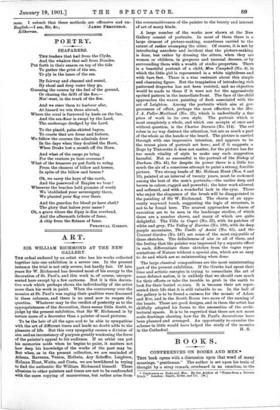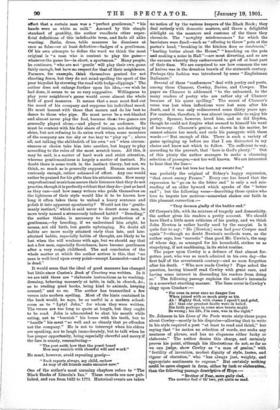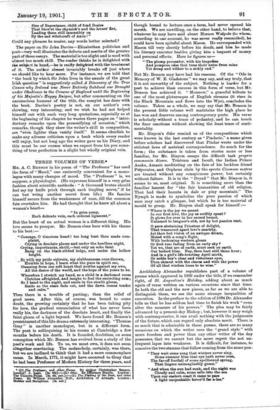BOOKS.
CONFERENCES ON BOOKS AND MEN.* This book opens with a discussion upon that word of many meanings, "gentleman." The author is set upon his train of thought by a stray remark, overheard in an omnibus, to the • Conferences on Books and Mon. By the Author of "Paged from a Private Diary." London : Smith, Elder, and Co. ilk.)
effect that a certain man was a "perfect gentleman," "his hands were as white as milk." Amused by this simple standard of gentility, the author recollects other super- ficial definitions of this indefinable term, and finds all alike wanting. Baths, dress, table manners he dismisses at once as false—or at least defective—badges of a gentleman.
Of his own attempts to define the word we think the most original is "a man who is content to play the gaine- whatever the game be—in short, a sportsman." Many people, he continues, "who are Not 'gentle' will play their own game fairly enough, but have no respect for that of their neighbours.
Farmers, for • example, think themselves genteel for not shooting foxes, but they do not mind spoiling the sport of the poor bicyclist by strewing the road with hedge-clippings." The author does not enlarge further upon his idea.,.—we wish he had done, it seems to us so very suggestive. Willingness to play your neighbour's game would cover almost the whole field of good manners. It means that a man must find out the mood of his company and suppress his individual mood. He must lament with those that mourn and do his best to dance to those who pipe. He must never be a wet-blanket and almost never play the fool, because these two games are generally played alone,—and played to an audience. He must be content with his fair share of innings, not desiring to shine, but not refusing to do extra work when some members of the company are too shy or too lazy to " play up " ; above all, not talking the shibboleth of his own " set " when circum- stances or choice take him into another, but happy to play according to the rules of the most scratch team. All this, it may be said, is a matter of hard work and strict attention, whereas gentlemanliness is largely a matter of instinct. No doubt there is some truth in the instinct theory, but not, we think, so much as is generally supposed. Human nature is, curiously enough, rather ashamed of effort. Any one would rather be praised for his gifts than his attainments. How many unprofessional musicians assure their listeners that they do not practise, though it is perfectly evident that they do—just as hard as they can—and how many writers who pride themselves on the lightness of their style would like it to be known how long it often takes them to unload a heavy sentence and polish it into apparent spontaneity P Would not the " gentle- manly instinct," which is said never to desert some men, be more truly named a strenuously induced habit P "Breeding," the author thinks, is necessary to the production of a gentleman,—by breeding, if we understand him aright, he means, not old birth, but gentle upbringing. No doubt all habits are more easily attained early than late, and late- attained habits, especially habits of thought, are likely to be lost when the will weakens with age, but we should say that not a few men, especially Scotelamen, have become gentlemen after a very rough childhood. The sad conclusion of the whole matter at which the author arrives is this, that "no man is well-bred upon every point—except Launcelot--and he is dead."
It would seem that the ideal of good manners has changed but little since Camton's Book of Courtesy was written. In it we are told there are "elaborate instructions as to washing, dressing, behaving mannerly at table, in talk, in church, Fie., as to reading good books, being kind to animals, keeping counsel," and so on. The author has transcribed a few verses into modem spelling. Most of the hints contained in the book would, he says, be as useful in a modern school- room as to " Lytyl John," for whom they were written.
The verses are too long to quote at length, but they ought to be read. John is admonished to shut his mouth while
eating, net to " burnish " his bones with his teeth, but to " handle " his meat "so well and so cleanly that ye offenden not the company." He is not to interrupt when his elders are speaking, nor to laugh immoderately, but to talk when he has proper opportunity, being especially cheerful and merry if the fare is scanty, remembering—
"The poet saith how that the poere board Hen may renrich with cheerful will and word."
He must, however, avoid repeating gossip- " Such reports always, my child, eschew As may of old friends msdre enemieb new."
One of the ialithor's most a:Musing Chapters refers to "The Bleak BOOkkl of Lineoln's Inn." These records are now pub- lished, ahtl run from 1422 to 1775. Illetdrica.1 events are taken
no notice of by the various keepers of the Black Book ; they deal entirely with domestic matters, arid throw a delightful sidelight on the manners and customs of the times they chronicle. The " nowghty misdemeanors" for which the barristers were fined-a-such as "offering to throw" pots at the porter's head, "breaking in the kitchen door ex insolencia," "hurling butter about the House," "knocking on the pots and making a noise in Hall "—are moat diverting, and so are the excuses whereby they endeavoured to get off at least part of their fines. We are surprised to see how common the use of knives was in the drunken brawls of the sixteenth century. Perhaps this fashion was introduced by some "Englishman Italianate."
Several of these "conferences" deal with poetry and poets, among them Chaucer, Cowley, Davies, and Cowper. The paper on Chaucer is addressed "to the unlearned, to the many readers of poetry who are rather shy of Chaucer because of his queer spelling." The secret of Chaucer's verse was lost when inflections were lost soon after his death, and it was only rediscovered some thirty years ago.
For centuries, therefore, it was almost impossible to enjoy his poetry. Spenser, however, loved him, and so did Dryden, though he could not forgive what seemed to himself his want of harmony. Chaucer's genius, as shown in his matter, he cannot admire too much, and ends his panegyric with these words :—" But enough of this. There is such a variety of game springing up before me that I am distracted in my choice and know not which to follow. 'Tis sufficient to say, according to the proverb, that here is God's plenty.'" Out of this plenty the author manages to make a charming selection of passages,—not too well known. We are interested
to hear that the line— "I can but love her best, my sweets foe,"
was probably the original of Sidney's happy expression, "that sweet enemy France." Every one has heard that the expression to "go on to the bitter end" is only a sad mis- reading of an older byword which speaks of the "better end" ; but the following verse—describing those cynics who love to impute low motives—somewhat shakes our faith in this pleasant correction :— " They deemen gladly of the badder end."
Of Cowper's life, with its mixture of tragedy and domesticity, the author gives his readers a pretty account, We should have liked a little more criticism of his poetry, and we think John Newton is rather hardly used by the essayist. Is it
quite fair to say : "He [Newton] soon had poor Cowper mad
again" P—though no doubt Newton's methods were, as the author says, less "narcotic" than good Mr. 'Cowin's, the map of whose day, as arranged for his household, strikes us as stupefying, if not maddening, in its strict routine.
The paper upon Cowley is a defence of that almost for- gotten poet, who was so much admired in his own day—the first half of the seventeenth century—and so soon forgotten after his death. "Who now reads Cowley P Pope asked the question, having himself read Cowley with great care, and having some interest in dissuading his readers from doing so." The following passage explains the author's innuendo in a somewhat startling manner. The lines occur in Cowley's elegy upon Crashaw "For even in error sure no danger lies When joined with so much piety as his. Ah ! Mighty God, with shame I speak% and grief,
Ah ! that our greatest faults were in belief.
His faith perhaps in some nice tenets might Be wrong ; his life, I'm sure, was in the right."
Dr. Johnson in his Lives of the Poets wrote sixty-three pages about Cowley—mostly in his dispraise—allowing that to write in his style required a poet "at least to read and think," but saying that "he makes no selection of words, nor seeks any neatness of phrase, and has no elegances either lucky or elaborate." The author denies this charge, and certainly proves his point, although his illustrations do not, so far as we can judge, show Cowley as "a man of genius," with "fertility of invention, modest dignity of style, lustre, and vigour of elocution," who "bas always just, weighty, and. appropriate sentiments to express." But certainly nothing odd' be mo're elegant in forms either by ln:ok or elaboliabittn, than the following passage di3hdrtptive of Bove :— " Brother of Fear, more gaily clad, The merrier fool o' Of two, yet quite as mad.
Sire of Repentance, child of fond Desire That blovest the ohymick's and the lovers' fire, Leading them still insensibly on By the sad witchcraft of Anon !"
Could any phrases be neater, any words better selected ?
The paper on Sir John Davies—Elizabethan politician and poet--vet7 well illustrates the defects and merits of the greater part of these essays. The material is too slight and is used with almost too much skill. The reader thinks he is delighted with the entbiez.t in hand,—he is really delighted with the treatment of it. The author almost invariably breaks off just where we should like to hear more. For instance, we are told that "the book by which Sir John lives in the annals of the great
Irish question" is suggestively called A Discovery of the True Causes why Ireland was Never Entirely Subdued nor Brought under Obedience to the Crowne of England until the Beginning of his Majestie's Happy Becigne, but after commenting on the
unconscious humour of the title, the essayist has done with the book. Davies's poetry is not, on our author's own showing, very interesting, and we wish he had not helped himself out with such very long quotations, especially as at the beginning of his chapter he wastes three pages on "intro- ductory remarks upon the personifying of occasion," which remarks, though they show the writer's skill in composition, are "eieh lighter than vanity itself." It seems churlish to make any adverse criticism upon a book which every reader will enjoy, but not long ago the writer gave us his Diary, and this must be our excuse when we expect from his pen some- thing of true perfection in a slight but wholly original vein.








































 Previous page
Previous page